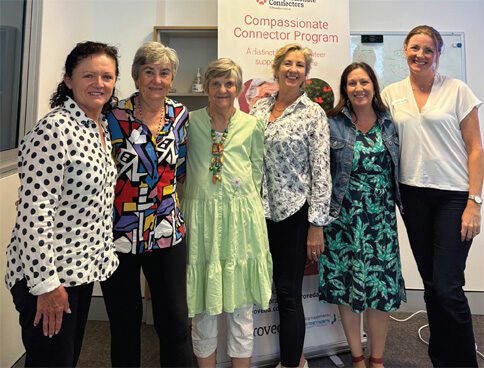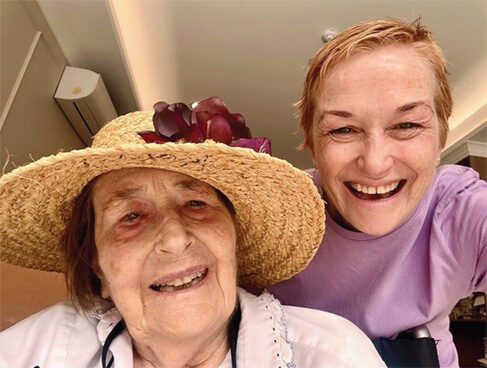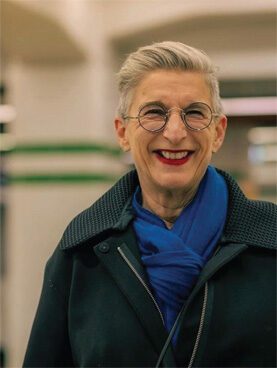Many find it hard to talk about death, yet it’s the only certainty in life. There is a growing community movement of those seeking to help people prepare and even celebrate their end of life. Aoife Moynihan reports.
We all hold a one-way ticket on life’s journey, with only one exit. Yet only 14% of us have an end-of-life plan. So why is death so difficult to talk about?
“Death is very scary for a lot of us, but is a big part of life,” death doula Kathryn Breusch says. “It happens to us all; nobody gets out of this life alive.”
A death doula provides practical and emotional support to people with a terminal illness and their carers. It starts with coffee and a conversation with the person themselves before meeting their family, but her relationship is usually with the dying person.
Practical advice might be on power of attorney or making a will, but it’s all about letting people know their options.
“It’s a minefield out there and often people don’t know where to start,” says Kathryn, who is from the Northern Beaches. “It could be that they want to die at home and weren’t aware that that was a possibility.”
A 2024 report, Too Little Too Late: The experiences of the last stage of life across Australia, by ‘death navigators’ Violet, found that 70% of people want to die at home, but only 15% do.
“Sometimes I’m engaged after the person has died and the family would like to keep them at home for another few days – you are allowed to keep your person at home for up to five days legally in NSW.
“If the death is sudden and they want to bring their person home and have someone with them for three days, I supply a cooling plate where the body is preserved at home, and you can make it look like they’re asleep in bed,” says Kathryn, who stresses that this isn’t for everyone.
Kathryn offers an alternative to the traditional ‘death care’ system which has not changed for decades. “The death care model looks down one road,” Kathryn says. “We’ve been locked into these 40-minute chapel and crematorium ceremonies, and it’s unfair for families to have to rush these services.”
The doula wants people to know there are alternatives. “It’s just letting people know that the person who has died belongs to you,” says Kathryn. “Not the medical world or the funeral director. They belong to you, and you are entitled to make all the decisions around your loved one. You should never feel pressured.
“Part of my work is letting people know that when the time comes, not to be scared or afraid and not to panic,” says Kathryn. “Because it’s an incredible privilege to watch a person take their last breath and to be able to sit quietly in it.”

Proveda’s Compassionate Connector Program volunteers
Jessie Williams is community program manager for Proveda, a national organisation based on the North Shore and Northern Beaches.
“When we’re not raised in a culture that celebrates (death) openly, we feel awkward as adults and don’t know how to respond,” Jessie says.
It was a personal experience with loss that resulted in Jessie getting involved in this field.
“My first baby died at birth full term; it was very unexpected and shocking,” says Jessie. “A social worker said I could bring my son home, so we had a vigil at home for three days. It was incredibly positive and healing.”
Jessie says talking about dying can change people’s outlook and they often live a better life.
“When shit happens in your life, wear your heart on your sleeve,” says Jessie. “Invite people in and if you’re being invited in, don’t be scared as it’s quite transformative for everybody.”
Proveda runs a national campaign, Dying to Know Day, annually on 8 August.
“Individuals across the country hold gatherings to talk about death, dying and grief,” explains Jessie. “These gatherings could be a multi-day expo or a group of friends having a dinner party and calling it ‘Death over Dinner.’”
Proveda is launching a grants program for Dying to Know Day where individuals can apply for a small grant from them ($500 to $5,000) if they want to activate something in their community.
More volunteers are needed for its compassionate connector program, which matches ‘connectors’ with people over 65 who need support. “It’s such a rich experience to be able to reflect on your own life and your own strengths to be matched with somebody to support them,” Jessie says.
The Death Café, also supported by Proveda, is a model which began in Europe and is now a worldwide phenomenon, where people chat about death over cake and a cuppa.
“It’s a small group of people having a discussion about death,” says Nicky Solomon, who runs two death cafes per term at the North Sydney Community Centre.
Nicky, who grew up in Middle Cove, had a friend and family member die before their time and was fascinated with people’s resistance to talking about the topic.
“People don’t prepare or only think about it when they’ve been given news that they are dying,” says Nicky. “And they leave the people they love in a state of chaos and crisis.”
The group discusses everything from power of attorney to wills. Sometimes people feel it is easier speaking with strangers, Nicky says, and they discuss how people are uncomfortable around grieving people.
“These people feel very isolated,” says Nicky. “They want to talk about the person who has died, but no one else wants to have that conversation.”
From a practical perspective, Nicky says that its convenient for funeral directors to use crematoriums, but says there’s no reason why you can’t hold funerals in parks or in restaurants and cafes. It’s all a matter of thinking outside the traditional practices and making death more accessible.

Violet guide Mitch (right) with her mother, Joan

Nicky runs a death café in North Sydney
For those who don’t want to meet someone face-to-face, death navigators Violet offer an online service which supports people caring for someone with a life-limiting illness or experiencing bereavement. Its AI service is good for those not ready to talk to a human, says Violet volunteer guide Mitch Gibson, who says it’s ‘bizarrely personal, empathetic and intuitive.’
People can set up a profile on the website or book a 45-minute telephone appointment with a guide, like Mitch, who all have experience caring for someone at the end-of-life and have lost a significant person.
Mitch found Violet after her partner, Mark, died from pancreatic cancer four years ago. She is also caring for her mother, Joan, 90, who has dementia. She says there’s an element of denial in why death makes people uncomfortable.
“Clearly, no one’s getting out alive!” Mitch says. “You don’t know when something will happen, when there’ll be a diagnosis because you had niggly back pain and the osteo couldn’t fix it and it turned out it was pancreatic cancer.”
Mitch says the beauty of Violet’s website is that is has all the resources available that people don’t know about. “Unless they’ve got someone about to die, they’re not going to randomly Google the burial options in Sydney,” she says.
Mitch is an advocate for dying at home if resources allow. As part of the Federal Government’s new Support at Home Program, from 1 November, people with three months life expectancy can apply for a $25,000 grant to set up their home.
Mitch says Mark wanted to die at home with her, their two cats and his sister, but it became too hard for them to manage.
“I was disappointed for him,” says Mitch “But we were in the palliative care ward for 11 days while his life slowly wound down and I didn’t have anything to do other than just love him. And that was the biggest, unexpected gift ever.”
Death Cafe
North Sydney Community Centre 4 July, 8 August northsydneycentre.com.au (see What’s On page)
Violet
violet.org.au
Support at Home
health.gov.au/our-work/support-at-home








